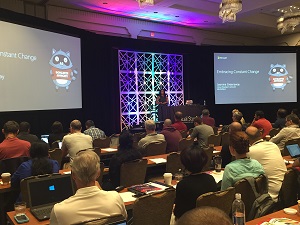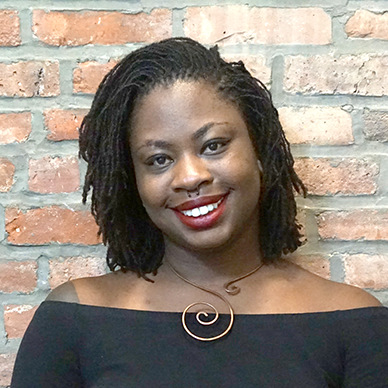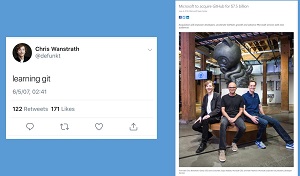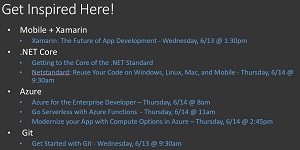News
VSLive! Keynote on Embracing Constant Change: 'You Owe It to Yourself'
"You owe it to yourself" was a continuing theme in the keynote presentation about embracing constant change at the Visual Studio Live! conference in Boston today, presented by Jasmine Greenaway, a cloud developer advocate at Microsoft.
You owe it to yourself, she told the audience in her keynote session, to keep learning and keep embracing new challenges in a profession where new technologies, libraries and ideas are introduced at an increasing rate.
Keeping up with the dizzying rate of change can seem overwhelming, but Greenaway mined her own experiences to reassure attendees that they can do it -- simply because they've they've done it before as proven by having arrived in their present positions.
"So what you want to do is take that past and apply it to what's out here today, what you're going to learn today, because you want to invest in yourself," she said. "Because you've done it before, and all that's changed is the technology and the problem, so just use what you know."
In detailing her own experiences, Greenaway explained how she progressed through a series of jobs, picking up new skills, technologies and techniques on each step of her journey, whether those skills related to programming languages such as C# and JavaScript or time management and eventually learning to translate business logic into code.
 [Click on image for larger view.] Jasmine Greenaway at VSLive! Boston (source: VSLive!).
[Click on image for larger view.] Jasmine Greenaway at VSLive! Boston (source: VSLive!).
After progressing from the retail space with Sears, to gaming with Rockstar Games, and to .NET developer tooling as a software engineer at GitHub, Greenaway found herself a cloud developer advocate at Microsoft, which led to a moment of self-doubt, sometimes called the imposter syndrome.
"I feel so lucky, because I'm in a position where I'm learning a lot," she said. "I didn't know much Azure when I started at Microsoft, so I said, 'what do I have to offer?'"
Then came the moment of reassurance and self-clarification. "I realized that everything that I've done, up to that point, counts. And I was able to apply it to the future that I didn't see for myself at that point when I was learning these things."
 "I realized that everything that I've done, up to that point, counts. And I was able to apply it to the future that I didn't see for myself at that point when I was learning these things."
"I realized that everything that I've done, up to that point, counts. And I was able to apply it to the future that I didn't see for myself at that point when I was learning these things."
Jasmine Greenaway, Cloud Developer Advocate, Microsoft
After asking the developers in attendance to take 15 seconds to reflect on the path that led them to their seats in the audience, she noted they probably saw a few patterns in their past experiences that changed over the years, as they did for her. However, "the things that we've learned have not. Those skills are still there. But you know what else has changed? The technology. And it's changing at an increasing rate."
The rate of increasing change can lead to worrisome questions, like "who moved my cheese," "who's changing these things" and "why does it matter?"
"It's so easy to get stressed out about it", she said of the new libraries popping up, all the new acronyms. But getting stressed out is not the answer.
"Don't overwhelm yourself with those details, because freaking out about it is not going to help you, it's not going to do anything about it," she said. "And remember that you have the skills, the skills that you have today, still apply. You've been through this before. You've been through these technology changes before.
"So what you want to do is take that past and apply it to what's out here today, what you're going to learn today, because you want to invest in yourself. Because you've done it before, and all that's changed is the technology and the problem, so just use what you know."
Conference attendees were in a great position to invest in themselves, she indicated, a position that was exemplified in a handy fill-in-the-blank letter that the conference provided to help "Sell Your Boss" and prove the value of attending Visual Studio Live! conferences such as the one in Boston. She read the letter verbatim:
Dear <manager-name>:
I would like to attend Visual Studio Live! Boston, June 10 - 14, 2018 at the Hyatt Regency in Cambridge, MA. The conference is produced by the publishers of MSDN Magazine, as well as sponsored and supported by Microsoft.
The up to 5 days of sessions and workshops at Visual Studio Live! Boston will:
- Improve my technical skills and make me a more valuable asset to the company.
- Give me the opportunity to learn from both industry experts and Microsoft product team members in a dev-focused environment.
- Make me more efficient and productive by shaving time and endless cycles off my development projects. Saving even 10 minutes an hour, would give me over 345 hours per year to spend on other critical projects.
- Allow me to network with other professionals in different industries to share best practices and gain new perspectives on the technology I work with daily.
- Open new avenues for me to find solutions for our biggest business and technology challenges.
The conference itself provides in-depth real-world training on:
- NEW! Full-day Hands-on labs Sunday, June 10
- Visual Studio 2017 / .NET
- ASP.NET Core and MVC
- Web and JavaScript Development
- Windows 10
- Azure / Cloud Computing
- Mobile Development
- Database & Analytics, including SQL Server
- DevOps/ALM
- And So Much More
If you have any questions about Visual Studio Live! Boston, please let me know, and I will share the conference literature with you. You can also view the conference website at vslive.com/boston. There are several conference packages available to purchase, ranging from a full conference and hotel package to one day passes.
Thank you for considering my request.
Sincerely,
<insert-your-name-here>
While that provides one answer as to why developers should invest in themselves, another answer is simply "because it's so easy to get started."
Getting started is made easier by all the documentation that developers have gotten so good at providing for new tools and libraries constantly emerging. Writing such documentation, Greenaway, said not only shares what developers have learned, but also demonstrates and shares your competency in a specific technology.
"So it's so easy to get started, and like I was saying before, this is an investment in yourself," Greenaway said. "The knowledge that you are going to learn, or the knowledge that you're going to absorb during your week here is something that nobody can take away from you.
"And you owe it to yourself to invest in yourself because you've been doing it all the way up to this point in time. And my favorite example of this is GitHub."
To illustrate her point, Greenaway shared a tweet from Chris Wanstrath, who said he was "learning git" on June 5, 2007:
 [Click on image for larger view.] Chris Wanstrath tweets he is 'learning git' and 11 years later -- almost to the exact day -- as CEO of GitHub, sells the company to Microsoft for $7.5 billion. (source: Twitter/Microsoft).
[Click on image for larger view.] Chris Wanstrath tweets he is 'learning git' and 11 years later -- almost to the exact day -- as CEO of GitHub, sells the company to Microsoft for $7.5 billion. (source: Twitter/Microsoft).
Next to that tweet was a photo of Wanstrath, by then a CEO and co-founder of GitHub, with Microsoft CEO Satya Nadella and exec Nat Friedman, after it was announced that Microsoft would acquire GitHub in a $7.5 billion acquisition. Greenaway noted that the date of the announcement, June 4, 2018, was almost exactly 11 years after Wanstrath tweeted that he was learning git.
"Investing in yourself can pay off" (to the tune of $7.5 billion), she emphasized again. "You owe it to yourself.
"So how do we do that. Start small, because I have a theory, I think that -- have you all ever heard of fomo, fear of missing out, fear of having opportunity pass you by? -- I feel that fomo is so relevant to our time in the industry today because of the speed of how fast things are moving, and I feel that it gives us a little twinge of imposter syndrome."
As an example, she remembered her time at Sears, where "I literally turned my head and Node happened. I was like, 'what's npm? What? What happened?' "
Greenaway reiterated that it's so easy to feel left out and feel like you've been left behind, but worrying about being left behind is not going to help you, and you have to get started. The best way is to not overwhelm yourself at the beginning of a new investment is to start small. "Whether that's reading documentation ... whether that's just going to a meetup and listening, even though you don't understand.
"Start small, no shame," Greenaway said. If you feel don't belong, that tech has passed you by, "that's the time to start asking questions" whether those questions come in a meeting or at venue like VSLive! when listening to a talk. If there's something you don't understand, don't be afraid to say "I don't know what that means."
Greenaway said some of best career advice she ever received came from a manager at GitHub.
"She told me, if you're not asking questions, you're not doing your job. It's about not questioning everything -- 'why are we doing this, why is it like this', it's about, 'how does this work?'. And then you take those 'hows' and you turn them into the 'whys' when you understand, and then you take those 'whys' and turn them into your 'what ifs' and then you use those 'what ifs' to go down your wish lists, you know, those little project wish lists, maybe it's a collection of repos that you start on in GitHub and you're like, 'Oh, I'll look at that later' or maybe it's a bunch of bookmarks -- you take those 'what ifs' and you go to your wish list. So have no shame in asking for help. Don't be embarrassed about it. Because you know what's more embarrassing? Acting like you know something, when you really don't."
There was one more piece of advice. "And finally, get inspired."
That's easy at VSLive!, Greenaway said, listing four core technologies -- Mobile+Xamarin, .NET Core, Azure and Git -- in the Microsoft dev ecosystem that were addressed with conference courses.
"We're all in a fortunate position today, because we can get inspired right here," she said. "So this is a list of some of the sessions related to technologies that we touched on today:"
 [Click on image for larger view.] Getting Inspired at VS Live! (source: Jasmine Greenaway).
[Click on image for larger view.] Getting Inspired at VS Live! (source: Jasmine Greenaway).
"You owe it to yourself," Greenaway said in conclusion. "Because you're in the right place, in the right time, and in the right company, to take those skills and those things that you've learned, and apply it to today.
"Apply it today, and apply it to your future self. Because you owe it to yourself. Because you've done it before. You've done it before, so you can do it. So I challenge you to go through those tips. And just start small. And starting small can just be listening to a talk. Like I said, invest in yourself. No one else is going to do it for you. Thank you."
The Visual Studio Live! conference will be at Microsoft Headquarters in Redmond, August 13-17.
About the Author
David Ramel is an editor and writer at Converge 360.